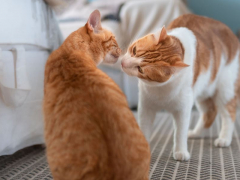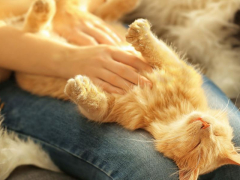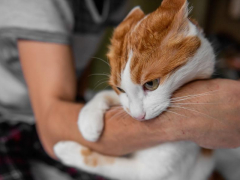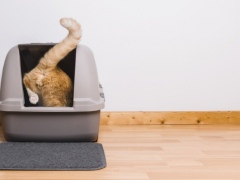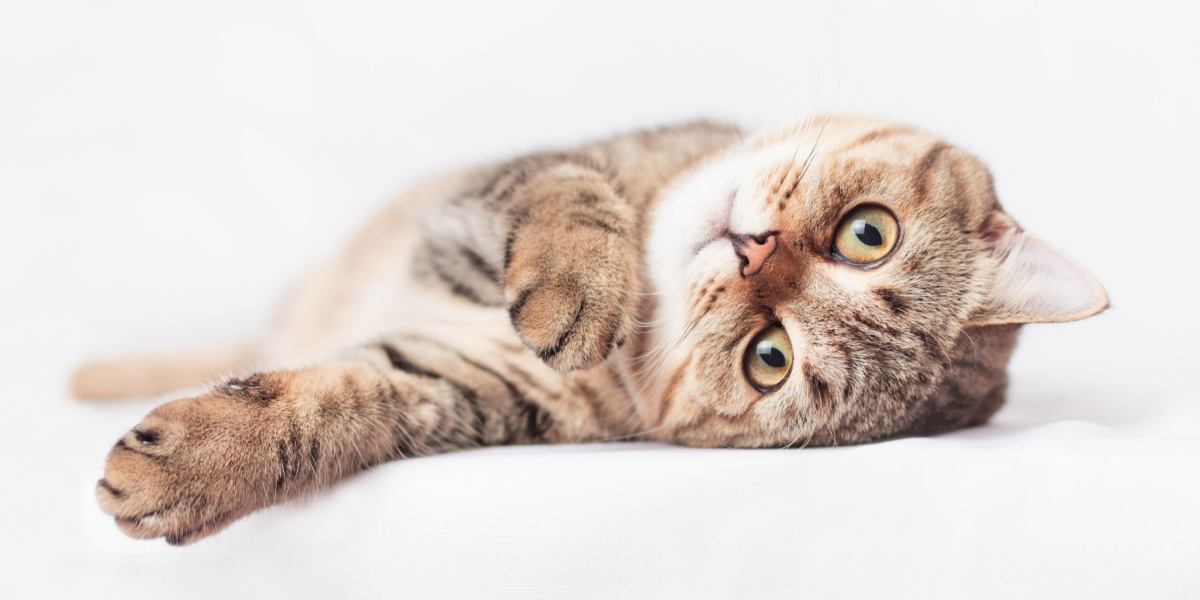
Have you ever wondered if cats get bored? Even though we provide cats with everything they need like food, water, and shelter, cats can suffer from boredom just as we can.
Cats that are kept indoors without access to the outside world are more likely to become bored. There are various signs that can indicate a cat is lacking mental and physical stimulation in their day-to-day life.
Read on to find out more about these signs so that you can figure out whether your cat is bored and what to do about it.
1. Excessive Vocalization
If your cat is bored, they might vocalize more than usual. Cats do not meow to communicate with each other. Instead, their meows are directed toward people. Cats vocalize in this way as a greeting, to ask for food, or to seek attention.
A bored cat that’s feeling a lack of stimulation might learn that you will pay them attention and maybe play if they meow constantly.
Also Read: 7 Common Cat Vocalizations And What They Mean
2. Destructive Behavior
If your cat has begun indulging in destructive behavior, they are likely suffering from boredom. Without enough activity to release all their energy, cats will resort to finding other ways to entertain themselves.
Unfortunately, this could take the form of scratching your furniture, carpet, or rugs. They might also delight in climbing up and damaging your curtains.
Also Read: The 5 Best Cat Scratch Deterrents
3. Overgrooming
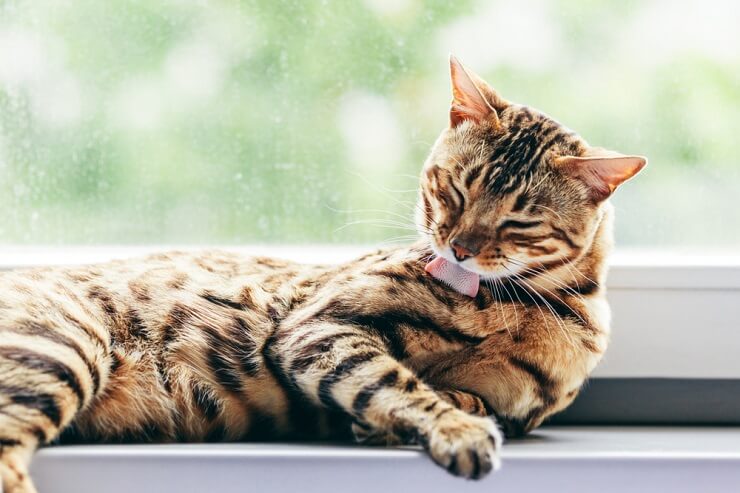
Excessive grooming can occur in cats that are feeling stressed and understimulated.
You might notice your cat grooming more if they aren’t receiving enough mental or physical stimulation. Overgrooming arises from feelings of stress, frustration, and boredom.
Cats will lick, chew, and pull at their fur and skin, leading to alopecia (hair loss), and irritation and inflammation of the skin. This type of compulsive and repetitive behavior should be addressed with your veterinarian as soon as possible.
Also Read: 5 Visual Signs Of A Stressed Cat And How To Help
4. Aggressive Behavior
Has your cat suddenly started picking fights with or chasing after other cats or dogs in the household? If the answer is yes, you likely have a bored cat who needs more interaction and exercise to keep them happy.
Also Read: Are My Cats Playing Or Fighting?
5. Lack of Interest or Activity
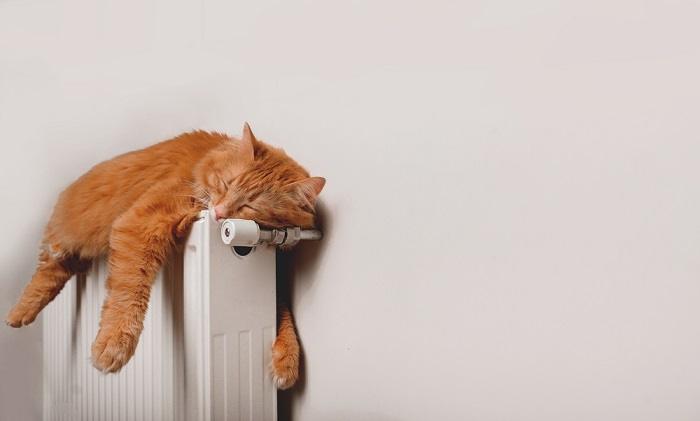
When cats stop exploring or interacting with you, they might be feeling bored and depressed.
Cats are usually curious creatures, with an active interest in what is going on around them. If your cat is feeling bored, they might lose that spark and be less inclined to engage and interact with others or their surroundings.
Also Read: Lethargy in Cats: Causes, Signs, Symptoms & Treatment
6. Overeating
Just as we can eat and eat and eat when we are bored, your cat may start viewing feeding time as an activity in the absence of other sources of stimulation. This can then lead to weight gain and obesity.
Being overweight will reduce their activity levels even further so we want to avoid that vicious cycle! It also increases the risk of your cat developing various medical conditions, such as diabetes.
Also Read: Why Is My Cat Not Eating? Loss Of Appetite In Cats
7. Oversleeping
When it comes to sleeping, cats are experts! They can spend 12 to 16 hours a day snoozing. But we expect them to engage in other activities during their waking hours.
If you’ve noticed your cat seems to be napping more than usual, then they could be doing so out of boredom. Without other activities or entertainment, they will simply resort to sleeping away the time.
Also Read: Why Do Cats Sleep So Much
8. Toileting Outside the Litter Box
When a cat is under-stimulated, they first experience boredom, which can then result in stress. Because of this, they may be inclined to pee or poo outside their litter box.
So, if you start to find waste on your floor or furniture, it’s time to start taking notice and figure out whether your cat could be bored. This is worth a trip to the veterinarian for a checkup as inappropriate elimination can also be a sign of a health problem.
9. Pacing
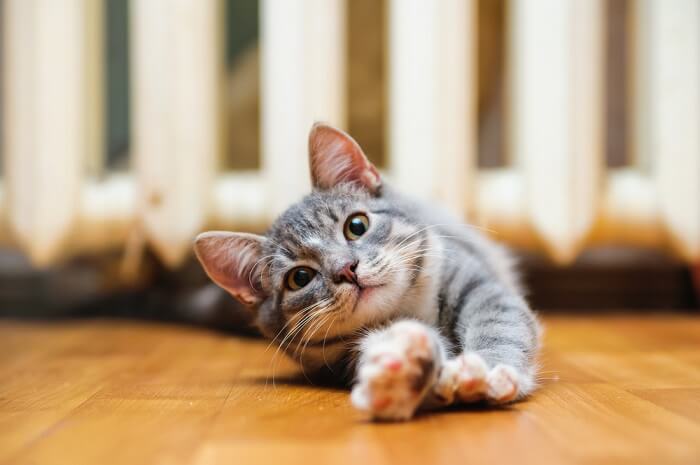
Aimless pacing is not typical cat behavior and could be a sign of boredom.
A bored cat that is not provided with enough opportunities to play and exercise might turn to pacing relentlessly back and forth. They might do so at the same time as meowing excessively to try and get your attention.
How To Prevent Your Cat From Getting Bored
1. Give Them Plenty of Toys
There are many different types of cat toys available to buy. You might have to figure out what your cat likes best. Always rotate the toys that your cat has access to. Otherwise, they will get bored of them quickly.
Set aside time for a couple of play sessions with your cat throughout the day. These should last around 10 to 15 minutes. Wand toys are great for this purpose and will get your cat up and moving. If you choose to use a laser pointer, make sure to end the session by pointing it at a toy that your cat can catch and “kill.” If you don’t do this, it can make your cat feel frustrated. Also remember to never shine the light from a laser pointer in your cat’s eyes.
Also Read: The 5 Best Interactive Cat Toys
2. Make Them Work for Their Food
Most cats are simply given their food bowls each day, without any need to work for their food. For mental stimulation, you can hide some of their food around the house, for example under furniture and rugs. You can also use treat balls that dispense kibble as your cat rolls them around. Puzzle feeders also make it more challenging for your cat to access food.
Also Read: The 10 Best Cat Slow Feeders & Puzzle Feeders
3. Give Them Vertical Space
Cats need vertical spaces so that they can climb, jump, and explore, as well as plenty of floor space to run around. You can provide them with access to shelves or other tall furniture. A cat tree will offer various levels and platforms.
4. Offer Window Access
Cats enjoy watching the world go by, even if they aren’t allowed to go outside. You can buy a specially designed window perch. Or, if you already have a cat tree, consider positioning it near a window instead.
Also Read: Is Your Cat Lonely? These 7 Signs Will Help You Find Out
5. Provide Catnip and/or Cat Grass
Catnip can be used occasionally to encourage activity and playing behavior. Sprinkle onto toys, scratching posts, and cat trees. Some cats also enjoy cat grass to fulfill their desire to chew.
Also Read: The 5 Best Catnip Products For Cats (Spray & Toys and More Surprises)
Final Words
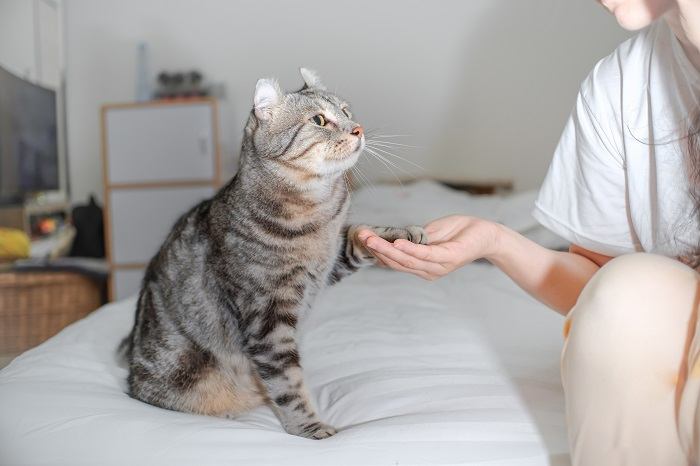
If you notice your cat displaying undesirable behaviors, consider whether they are getting enough daily stimulation, interaction, exercise, and play.
Cats are often happy to be left alone, but we still need to make sure that their home environment is offering them enough stimulation—mentally and physically. A bored cat will end up displaying undesirable behaviors, including excessive vocalization, overgrooming, and inappropriate elimination.
The best way is to prevent boredom from setting in at all. This can be achieved by making some changes in the home so that your cat’s senses and instincts are catered for. Finally, it’s important to keep in mind that unwell cats can also show some of the above signs. Speak to your veterinarian if you are concerned your cat has potential health issues.
Also Read: How Do Cats Communicate With Each Other? A Veterinarian Explains
-
Atkinson, T. (2018). Practical Feline Behaviour. Oxfordshire, UK: CAB International.
-
Radosta, L. (2014). Environmental Enrichment for Cats. Retrieved 19 September 2022, from https://www.cliniciansbrief.com/article/environmental-enrichment-cats.
